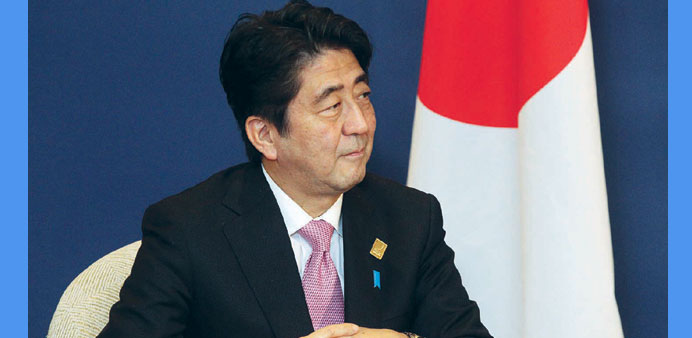Bloomberg/Tokyo
Two Japan bulls say Prime Minister Shinzo Abe is achieving his goal of reviving the economy by weakening the yen – and there’s more to come.
Stefan Hofer, the chief investment strategist in Asia at BNP Paribas Wealth Management, said the yen may drop about 8% to 130 per dollar over a year, boosting earnings that have driven an equity rally. Jay Glasser, a former Citigroup trader who started his own investment office, sees 140 to 160 by year-end, helping his bets on yen losses and gains in Japan’s bonds and stocks. Those forecasts compare with the median for a weakening of about 4% to 125 in a Bloomberg survey of analysts.
“I am more bullish today than I have been in the last three years,” Glasser, who invests through his Roppongi Capital Management, said in a March 24 telephone interview from New York. “All of the favourable things that Prime Minister Abe promised the people, the structural reforms, have finally started to bear fruit.” Hofer and Glasser are diverging from the consensus as financial professionals are the most bearish on the country and its leaders since 2012, a Bloomberg poll shows. Abe is struggling to shake off a recession as industrial production contracts and consumer spending declines for an 11th straight month.
Bank of Japan Governor Haruhiko Kuroda is warning there’s a risk of consumer prices falling even as he targets 2% inflation. All of that hasn’t stopped the Topix share index from advancing 10% in the first quarter through Tuesday including reinvested dividends, the most since the January-to- March period of 2013.
“The depreciation of the yen is fundamentally a very successful policy,” Hofer said in a briefing with reporters in Hong Kong March 25. “Many financial market participants do not fully acknowledge the changes that have taken place in Japan.
Overseas investor interest in Japanese real estate has picked up. Wages are rising.” Abe came to power at the end of 2012 with a three-part economic plan: fiscal stimulus, deregulation and the BoJ monetary plan known as quantitative and qualitative easing.
Critics say that more than two years later, the readings on Japan’s economy are mixed. Industrial production shrank 3.4% in February, matching the largest decrease since 2011.
Consumer spending contracted 2.9% from 12 months earlier.
The nation suffered a recession last year. One measure of inflation is at zero, and Kuroda reiterated Tuesday he couldn’t rule out the risk of consumer prices falling temporarily.
In the Bloomberg poll, which was conducted in January, only 7% of the respondents said the nation offers one of the best opportunities among major markets.
“It is clear that Kuroda’s QQE isn’t quite working,” said Makoto Kikuchi, the chief executive officer of Myojo Asset Management, a Tokyo-based hedge fund. “What did Abenomics accomplish? Economic growth certainly hasn’t shown any improvement.” The result will be a tumble in the Nikkei 225 Stock Average to 13,000 at the end of 2015, he said in a telephone interview on Tuesday, cutting its value by about a third.
Japan’s yen has fallen by almost a quarter the past two years and traded at 119.69 per dollar as of 10:47 am in Tokyo as the central bank uses asset purchases to pump money into the economy, its main weapon in the battle to snap 15 years of stagnating prices. The BoJ is boosting its bond holdings by ¥80tn ($668bn) a year, and it now owns more than 20% of the government debt market.
The BoJ’s policies are aimed at achieving price stability, not bringing the yen into a specific range, Kuroda said in Parliament on March 30. A weaker currency raises stocks and profits of exporters, while pushing down the profits of non- manufacturing companies, he said.
Abe said at the same session that monetary easing is aimed at ending deflationary mindsets, and that “our polices” are not aimed at weakening the yen.
Japan’s problem had been that attractive real yields, which are enhanced when a country has deflation, were supporting the currency, Glasser said. The benchmark 10-year Japanese government bond yield was 0.39% yesterday. Adjusted for inflation, the rate was about minus 1.8%.
“Yields were staying positive, providing positive real returns to investors, which was forcing exporters to choke,” he said. “No central banker will ever say they will trash their currency. But they can create policies, which as a derivative, could create a very weak currency by blowing up the balance sheet.” Glasser said he made 600% over three years betting against the yen and on Japanese stocks and bonds, enhancing returns with derivatives. The year-to-date gain is 53%, he said. The Nikkei 225 will push past 22,000 this year, Glasser said, or about 15% higher from Tuesday’s close.
BNP’s Hofer said Abe is working on developing special economic zones, improving corporate governance, reforming Government Pension Investment Fund and increasing immigration.
A lot of foreign investors are still significantly underweight Japanese stocks, he said. BNP Paribas Wealth Management had the equivalent of $318bn in assets as of June.
“The Bank of Japan has to work extra hard to generate inflation expectations,” Hofer said. “That’s why we see the yen going to 130.”

Abe: Seeing the sign of revival.
